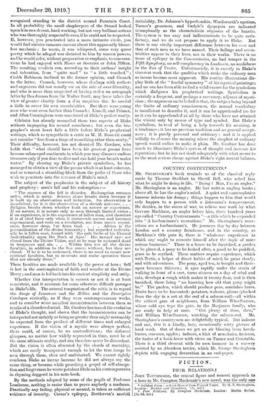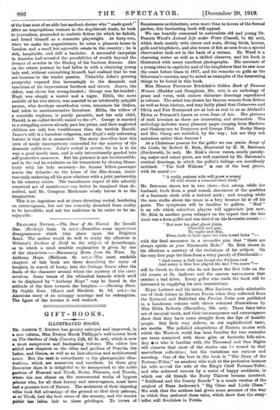FICTION.
PO OR RELATIONS. t
Joini TOUCHWOOD, the central figure and nearest approach to a hero in Mr. Compton Mackenzie's new novel, was the only one
• Syllabub Farm : a Quiet !lamest from Unquiet Timer. By H. T. Ethel:Ingham. London : Hodder and Stoughton. fie. net.]
t Poor Relations, By Compton Mackenzie. London : Martin Seeker. [7s. 6d. net.J af the four sons of an able but sardonic doctor who " made good." After an unpropitious venture in the dog-biscuit trade, he took to journalism, proceeded to realistic fiction (in which he failed), and found himself as a romantic playwright. At forty-two, when we make his acquaintance, he owns a pleasant house in London and a small but agreeable estate in the country ; he is rich, hospitable, and still a bachelor. A successful campaign in America had revealed the possibilities of wealth beyond the dreams of avarice in the filming of his luscious dramas. Also on the return journey he had fallen in with a charming young lady and, without committing himself, had realized that he was not immune to the tender passion. Unluckily John's growing prosperity exposed him increasingly to the demands and exactions of his impecunious brothers and sisters. James, the eldest, was clever but wrong-headed ; George was fat-headed ; Hugh was simply a waster and a rogue. Edith, the more amiable of his two sisters, was married to an intolerably priggish parson, who develops unorthodox vews, renounces his Orders, and takes to unreinunerative literature. Hilda, the widow of a scientific explorer, is purely parasitic, and her only child, Harold, is an enfant terrible raised to the ntn. George is married to a struggling actress already past her prime, and their neglected children are only less troublesome than the terrible Harold. James's wife is a harmless vulgarian, and Hugh's only redeeming feature is that he is unmarried. The story describes how this crew of needy incompetents contended for the mastery of the domestic railch-cow. John's ordeal is severe, for he is in his way a good family man, and is only intermittently goaded into self-protective measures. But his patience is not inexhaustible, and in the end he retaliates on his tormenters by eloping blame- lessly with his lady secretary—his former fellow-passenger across the Atlantic—to the home of the film-drama, simul- taneously endowing all his poor relations with a joint partnership in his country estate. The tumultuous sequel of this adroitly contrived act of munificence can better be imagined than de- scribed, and Mr. Compton Mackenzie wisely leaves it to the imagination.
This is an ingenious and at times diverting recital, bordering on extravaganza, but not too remotely detached from reality to be incredible, and not too malicious in its satire to be =- enjoyable.







































 Previous page
Previous page